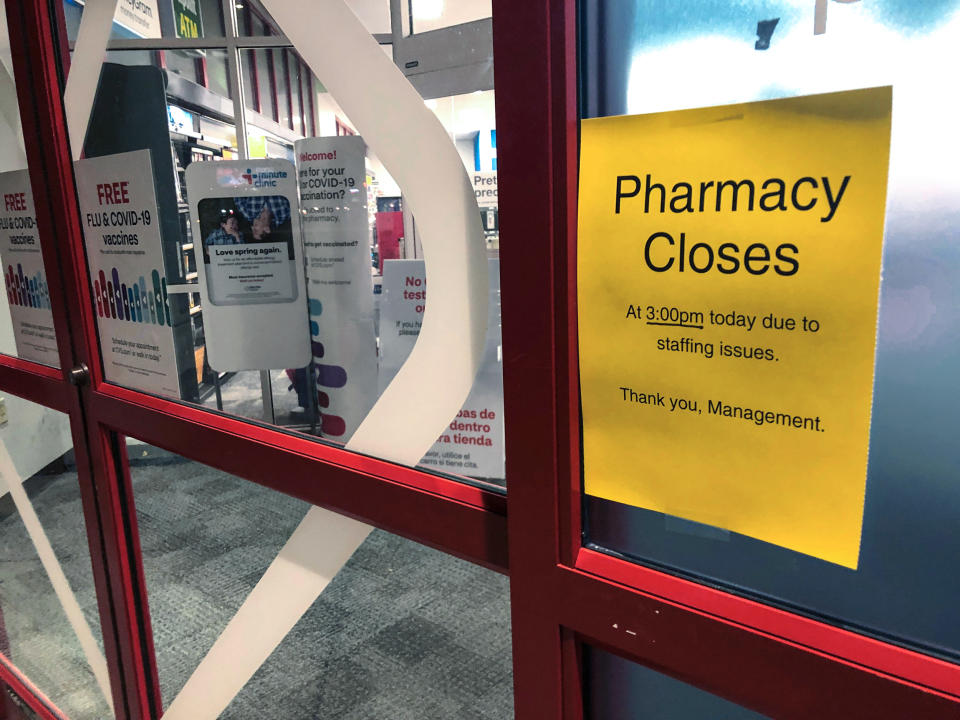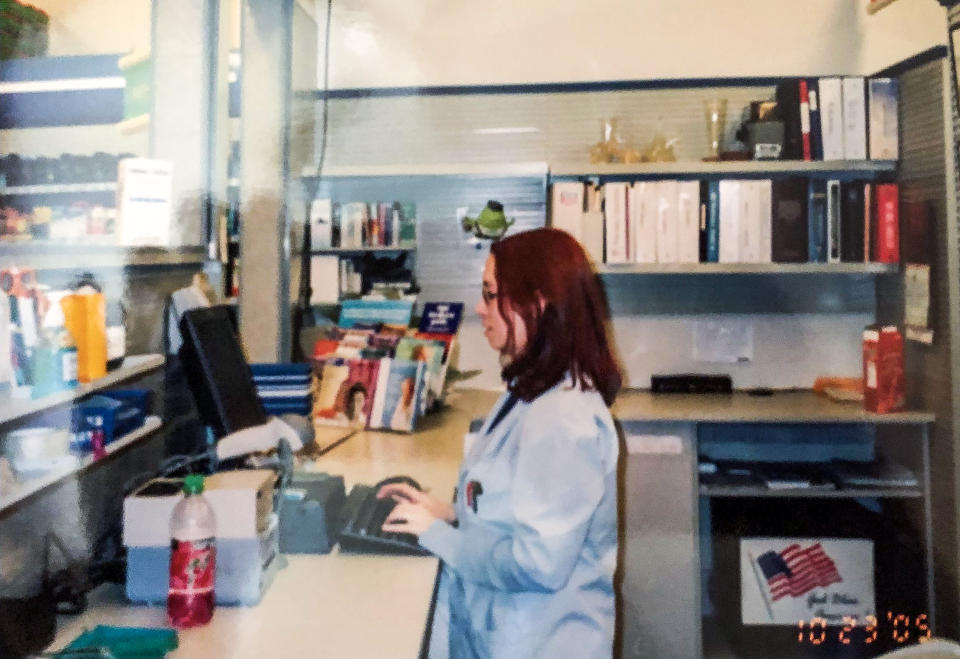Pharmacies don't have enough staff to keep up with prescriptions
Heidi Strehl worked as a pharmacy technician at a Rite Aid in the Pittsburgh suburbs for more than 16 years. She loved her customers, enjoyed her job and thought of her co-workers as family. But this fall, Strehl abruptly quit, walking out in the middle of a shift — one of many in a wave of pharmacy technicians who are doing the same.
Most of the people behind pharmacy counters who count pills and fill medication bottles are pharmacy technicians, not pharmacists — low-wage workers in positions that don’t require college degrees. Working in a pharmacy was always fast-paced, Strehl said, but in recent years the workload and stress had increased to unsustainable levels, while staffing and pay failed to keep up. During the coronavirus pandemic, the pace quickened further, especially once pharmacies began giving Covid-19 vaccine shots. Her store regularly ran behind on prescriptions, often with several hundred waiting to be filled each morning.
“It got to the point that it was just such an unsafe working environment, where you are being pulled a thousand different directions at any given time,” she said. “You’re far more likely to make a mistake and far less likely to catch it.”
The last straws for her came in October. Strehl said she got an “insulting” 25-cent raise, bringing her to $15.08 an hour. A few days later, after yet another customer yelled at her over a delayed prescription, she had a panic attack in a corner of the pharmacy, crying and struggling to breathe while work continued around her. Then she grabbed her things, hugged her co-workers and walked out for the last time.

“I always thought I would retire from that place,” Strehl said. “But all of the parts of my job that I truly enjoyed over the years had slowly just gone away.”
Strehl is one of about 420,000 pharmacy technicians in the U.S. Even though they aren’t highly paid — the median pay is $16.87 per hour — and often have no pre-employment medical training, they are vital to the health care system. They help pharmacists fill and check prescriptions and make sure patients get the right medication in the right amounts at the right time. Some even give vaccinations.
In recent months, many technicians have quit, saying they’re being asked to do too much for too little pay, increasing the possibility that they will fill prescriptions improperly.
Employers, from major drugstore chains like Rite Aid, CVS and Walgreens to mom-and-pop pharmacies and even hospitals, are struggling to replace them. It’s yet another of the labor shortages that have gripped the country this year. At many drugstores, the pharmacy staff members who remain are stretched thin. The shortage has led to dayslong waits for medication, shortened pharmacy hours and some prescription errors and vaccination mix-ups — like children receiving an adult Covid-19 vaccine shot instead of a flu shot — in a business sector in which delays and mistakes can have serious health consequences.
“Over the last five to six months, we’ve seen a spike in these conditions,” said Al Carter, the executive director of the National Association of Boards of Pharmacy, a nonprofit organization that represents state pharmacy regulators. “In some states you have 60 or 70 pharmacies that are closing for days on end, because they don’t have the appropriate staff.”

While the shortage of technicians is being felt throughout the pharmacy industry, Carter said retail pharmacies, which have some of the lowest-paying positions in the industry, have been hit the hardest.
NBC News spoke to 22 retail pharmacy technicians in 16 states who recently quit or were considering quitting their jobs at major retail chains. Their experiences echoed Strehl’s. Workload rose dramatically during the pandemic, but staffing levels didn’t, with many stores instead losing workers and struggling to fill positions, compounding stress and burnout. All of the technicians said patient safety was their biggest concern.
“Being consistently overworked, underpaid, stressed out and behind, there’s room for way too many mistakes,” said Bella Brandon, who left her technician position at a CVS in Ohio in July without having another job lined up because she was so concerned about the potential for a deadly medication error.
“I had to get out of there as soon as possible,” said Brandon, who now works in a hospital pharmacy with higher pay and more staff members. “It’s not my job to play God."
Rite Aid, CVS and Walgreens all said they are proud of their staff members’ work during the pandemic and are taking steps to support them, including major hiring efforts, often with signing bonuses. Rite Aid said it was temporarily closing most pharmacies an hour early to alleviate stress and help staff members catch up on work. Walgreens said that when staffing shortages affect stores, it may temporarily adjust store hours. CVS said its teams “remain flexible in meeting patients’ needs” during the national workforce shortage.
Both Walgreens and CVS recently announced that they would increase technicians’ starting salaries to $15 an hour or more. In a statement, the National Association of Chain Drug Stores lauded the work technicians do and encouraged consumers to make vaccination appointments ahead of time to help manage workflow in busy pharmacies.
‘Not a cheeseburger’
Pharmacies can’t run without technicians, who do the lion’s share of work behind the counter, from counting pills to taking phone calls and ringing patients up. While anyone can become a technician, filling prescriptions is a complex process, more than two dozen technicians and pharmacists said. It takes months of training about drug interactions, insurance claims and more to become skilled and efficient. Many states and employers require technicians to earn certifications after a certain number of months of work, as well.
Pharmacists, who have doctorates and make six-figure salaries, check technicians’ work, consult with doctors, counsel patients and give vaccination shots. During the pandemic, many states began allowing technicians to give vaccination shots, as well, but everywhere, pharmacists and technicians said, the expectations for both jobs have been increasing.
“In an unsafe environment — because of the shortage of staff and increased workload that is being presented to that staff — your chance for error is going to increase,” Carter said. “When you’re dealing with medications, any prescription error could be life or death.”
As the pressure has mounted, mistakes have increased, technicians said. They, their pharmacists or their patients are catching more miscounts of pills, mislabeled doses, even medications packaged in the wrong person’s bag. Regulators are getting more complaints about prescription errors, as well, Carter said.
In statements, CVS, Rite Aid and Walgreens all said that patient safety is their top priority and that they have systems to ensure that prescriptions are filled safely and accurately.
And then there are the vaccine mix-ups. In Texas, Indiana and Maryland, for example, patients have reported being given Covid-19 vaccine shots instead of flu shots, including several children who were given adult doses. Asked about the vaccination errors, Walgreens, which owns the stores where they happened, referred NBC News to its patient safety statement. Multiple technicians said they were afraid of moving so quickly and processing so many different kinds of vaccines that they might accidentally make the same mix-up.
Pharmacy working conditions have been a growing concern for regulators and pharmacy trade groups for years. The biggest concerns are at retail chain pharmacies, multiple state regulator surveys show. As Covid-19 vaccinations began in earnest last spring, pharmacists warned that without additional staffing, increasingly overworked and understaffed pharmacies would pose a threat to patient safety, NBC News reported in March.
The industry was already in crisis then. After years of declining profits and higher fees from middlemen who set drug prices nationally, pharmacies were increasingly pushing pharmacists and technicians to do more with less. In March, Carter said, he predicted that the conditions would get worse as the pandemic wore on.
Eight months later, technicians across the country said they have. Some said they often go full shifts without bathroom or meal breaks. A survey of pharmacy technicians from Ohio’s pharmacy board this month revealed that 60 percent of the 2,560 respondents felt their workloads didn’t allow them to provide for patients safely.
“It’s not a cheeseburger we’re talking about. ... This is life-sustaining medication in some cases, so you have to be able to focus on one thing at a time, not four things,” said Kimberly Bailey Parry, a technician in Illinois who said she left her job at a CVS in a Target in August after 10 years to work for another pharmacy with better working conditions. “We were constantly being pulled in so many directions that it was only a matter of time before there was a major mistake.”
Many technicians said there is little incentive to stay at most retail pharmacies when less stressful jobs are easily available for higher pay. They’ve gone to work at hospitals, pharmaceutical wholesalers and pet pharmacies or left the health care sector entirely.
Lea Polites, a Walgreens technician in New Jersey, said she is burned out and looking for another job. She showed NBC News local listings for a hotel clerk, a grocery store assistant manager and a cable sales representative, which all started with higher salaries than she was being paid as a technician. “If you want someone to take the job seriously, you might want to pay more than the local grocery,” she said. “They’re driving all the good people away.”
Major retail chains have made massive hiring pushes — CVS alone hired more than 10,000 pharmacy technicians in 2020. This year, it said, it is hiring thousands more. But overall, experts said, it’s getting harder and harder to attract technicians throughout the industry.
The annual number of job openings for pharmacy technicians industrywide has grown by nearly 60 percent in the last five years, much of it since the pandemic began, according to the American Association of Colleges of Pharmacy, which tracks changes in the pharmacy labor market. Recent hiring pushes by large employers account for only part of the increase. Nearly 90 percent of independent retail pharmacies were struggling to find technicians, according to a survey last month of more than 300 independent pharmacy owners and managers by the National Community Pharmacists Association. Independent pharmacies make up one-third of all retail pharmacies.
‘So burned out’
Jobs that start as entry-level positions, with limited upward mobility and often salary caps, don’t encourage workers to build careers. The 22 technicians NBC News spoke to made $11.90 to $23 an hour, even though some, like Strehl, had more than a decade of experience.

Scott Knoer, the chief executive of the American Pharmacists Association, previously led the Cleveland Clinic’s pharmacy department, where he and colleagues examined turnover rates among the hospital network’s staff members. They found that pharmacy technicians had far higher turnover rates than radiologic and nuclear medicine technologists and made about half their salaries. The hospital system classified each position similarly, but pharmacy technician was the only role of the three that didn’t require an associate’s degree.
“We have to pay pharmacy technicians more,” Knoer said. “It’s a rewarding job, but it’s not an easy job. So it’s not shocking that we have a shortage.”
Pharmacy workers face an uphill battle in their push for better pay and working conditions. There are pharmacy trade associations and other industry groups, but unlike many other health care workers, few pharmacists and technicians are unionized. A group of pharmacists with large social media followings is pushing to change that, raising money through GoFundMe to create a national pharmacy workers union; it has raised $22,000 since the pandemic began.
There is recognition from established industry groups that things can’t continue as they are. The National Association of Boards of Pharmacy, run by Carter, convened a task force last month to look at working conditions and how to address the patient safety issues they create. Some boards of pharmacy are changing rules to decrease workloads and provide more flexibility and worker protections.
A few regulators have turned to discipline. In the last two years, the Virginia and Oklahoma pharmacy boards have fined CVS hundreds of thousands of dollars over pharmacy working conditions, including inadequate staffing, saying they have led to prescription errors. CVS said that it agreed to the Oklahoma board’s terms “to avoid the time and expense of a protracted hearing process,” not as an admission of guilt, and that it disagreed with the board findings in Virginia, calling many of the staffing allegations in the board’s report “inaccurate and outdated.”

Many of the technicians who recently quit and spoke to NBC News said that despite the conditions, the work itself was something they loved. Strehl was one of them. But for people like her, who tried to build a career as a technician, industry reforms may be too little, too late.
“I was passionate about my job,” she said. “I never really thought that I would leave.”
Strehl’s husband, a baker, is providing the sole full-time income for their family of four sons and two dogs. She said they have enough money saved to get through the holidays without her paycheck, but she doesn’t know what’s next.
“I’m so burned out that I don’t know that I will ever try to do that again. At the same time, I really can’t see myself doing anything else,” Strehl said. “I called that place my home so many times. But the home that I knew is not the environment that exists.
“My heart is still there — I just can’t right now.”
CORRECTION (Dec. 30, 2021, 3:45 p.m. ET): A previous version of this article incorrectly said there are no national organizations that represent pharmacy technicians. Those workers are represented by the American Association of Pharmacy Technicians, a national non-profit group.

